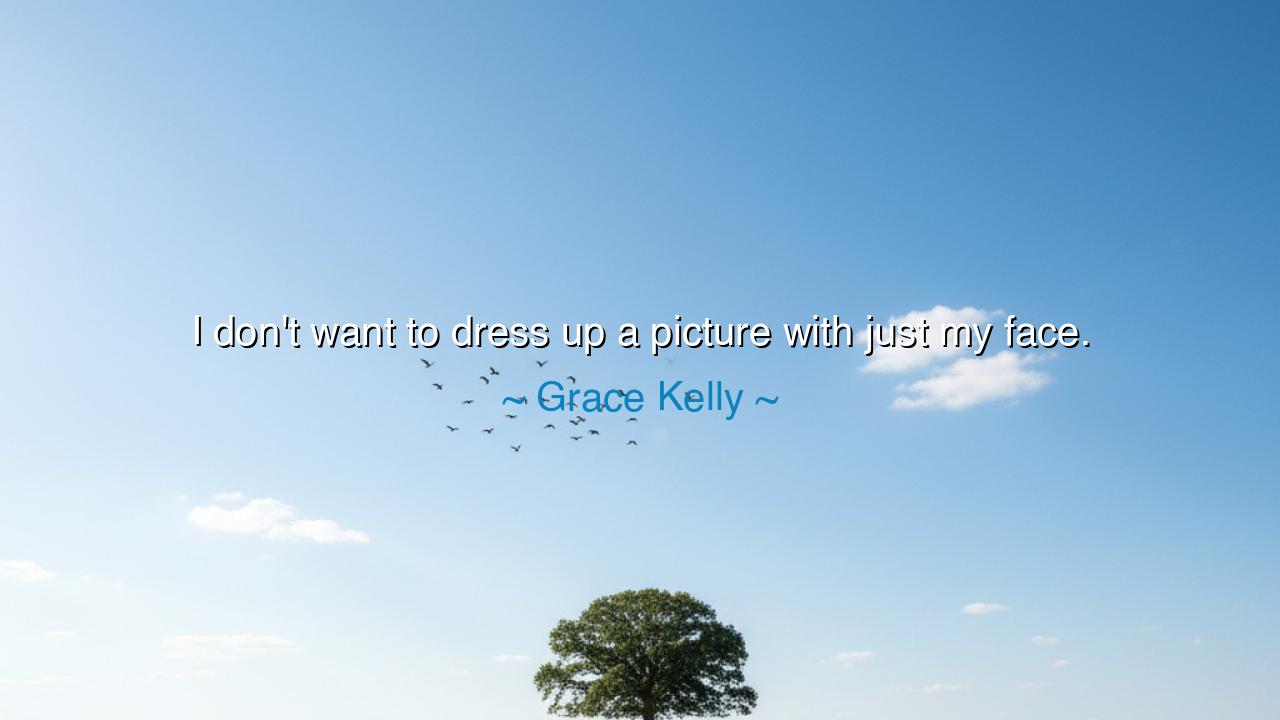
I don't want to dress up a picture with just my face.






Listen closely, O children of the future, to the words of Grace Kelly: "I don't want to dress up a picture with just my face." In this simple but profound statement, Kelly speaks to the very essence of art and authenticity. She did not wish to be merely a figurehead, an ornament for a film, where her beauty alone would carry the weight of the story. Instead, she sought to bring depth to her roles, to be more than just a physical presence on the screen. This quote reveals her understanding that true art, whether on the stage, in a film, or in life, is not about appearances alone, but about substance, truth, and the depth of the experience.
In the ancient world, O children, the greatest artists—whether in the realms of sculpture, literature, or theater—were those who sought not just to present beauty, but to imbue it with meaning. Sculptors like Phidias did not merely craft statues that were pleasing to the eye; they sought to capture the spirit of their subjects, to imbue each stone with the essence of what it meant to be human—the grace, the strength, the sorrow, the joy. Grace Kelly, in her acting, sought something similar. She understood that beauty alone could not carry a film; it was the depth of emotion and the truth of her character that would truly resonate with the audience. She did not want to merely dress up a picture with her physical beauty—she wanted to fill it with something far more powerful.
Consider, O children, the story of Sophocles, who wrote the great tragedies of Oedipus and Antigone. Sophocles was not content with merely creating stories of sorrow and fate—he sought to reveal the truth of human nature. The characters in his plays were heroes and heroines, but not for their beauty alone. They were heroes because they struggled with the depths of morality, identity, and fate. In the same way, Grace Kelly sought to portray characters who were not simply beautiful, but complex, human, and deeply real. Her work was about depth, and about offering a vision of humanity that transcended the surface of appearances.
In her film career, Kelly appeared in films like "Rear Window" and "To Catch a Thief", where her beauty was undeniable, but it was her grace, her intelligence, and her emotional range that left a lasting impact. In "Rear Window", she portrayed a woman who was not just a glamorous socialite, but someone who deeply cared about the well-being of others. Her character was layered with complexity, struggling with personal desires and her role in Jimmy Stewart’s character’s journey. She did not allow her face to be the sole instrument of the film’s meaning; she used her talent and inner depth to breathe life into a story that dealt with themes of suspicion, love, and mystery.
In the same way, the greatest philosophers of ancient times—such as Plato and Aristotle—understood that true wisdom is not a matter of appearance but of the soul and the mind. The beauty of the world, as they saw it, lay not in its surface qualities, but in the truths it revealed. Plato’s Allegory of the Cave spoke to the idea that humanity must look beyond the surface, beyond the shadows, to seek the truth of reality. Grace Kelly too sought to look beyond the superficial, to reveal the truth of the characters she portrayed, to uncover the depths of their lives and their emotional landscapes. Like the great philosophers, she believed that true beauty and art come from the heart, not just from the outward appearance.
The lesson here, O children, is one of profound integrity and substance. In life, we are often told that beauty is everything—that how we look, how we present ourselves, is the measure of our worth. But true worth lies not in the outward display, but in the depth of character, in the truth of our emotions, and in the honesty with which we live. Like Grace Kelly, do not let your appearance be the sole measure of who you are. Just as she sought to elevate the art of film with her inner talent and emotional depth, so too should you seek to enrich the art of your own life. Dress your actions not with superficiality, but with meaning, purpose, and authenticity.
And so, O children, in your own lives, seek not to be mere decorations in the world, but creators of meaning, of depth, and of substance. Let your work—whether in your relationships, your studies, or your creations—be grounded in the truth of who you are, not just in what the world sees. Like the great artists, philosophers, and heroes of the past, let your legacy be one of true depth and authenticity, where the beauty of your soul is reflected in every action, every word, and every creation. Only in this way can we rise above the surface, to live lives that are not just seen, but truly felt.






AAdministratorAdministrator
Welcome, honored guests. Please leave a comment, we will respond soon